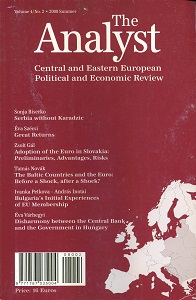The Pathology of Reform – Some Reflections after the Referendum
The Pathology of Reform – Some Reflections after the Referendum
Author(s): Zoltán FarkasSubject(s): Politics / Political Sciences
Published by: Globális Tudás Alapítvány
Summary/Abstract: Key influential figures in Hungarian business, employers’ organizations and chambers of commerce have been lobbying the government and opposition parties for years to finally enter into some kind of dialogue on what needs to be done in order to put the economy onto a more rapid path of development – as it happens, to no avail. Successive parties in opposition – by and large from 1995 onwards – have resisted all attempts at stabilization and reform, even refusing to vote for the kind of legislative proposals which they themselves might be expected to put forward were they in government. Successive governments, meanwhile, have for the most part postponed taking the necessary measures; even when they have taken reform-driven decisions in the initial period after gaining power, any perceived loss of popularity has prompted them to quickly step back from their original plans. This is what happened after the elections in 2006, when the government of Ferenc Gyurcsány was forced, following the chronic budget overspending of the preceding years, to adopt a vigorous stabilization policy, while at the same time embarking on a radical transformation of the local government, education and healthcare systems aimed at reducing expenditures and maintaining the balance in public finances over a sustained period. Despite this, at the referendum forced by the opposition in the spring of 2008, some three million people said no to medical consultation fees and higher education tuition fees, elements of reform that can be considered symbolic. This constituted a strikingly powerful rejection, which has for a time brought to an end a period of reform that was characterized by strong government rhetoric.[...]
Journal: The Analyst - Central and Eastern European Review - English Edition
- Issue Year: 2008
- Issue No: 02
- Page Range: 21-46
- Page Count: 26
- Language: English

